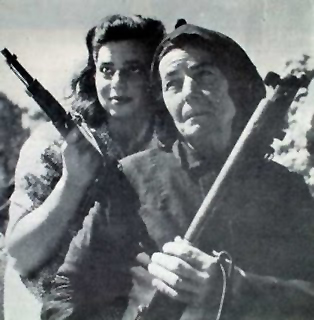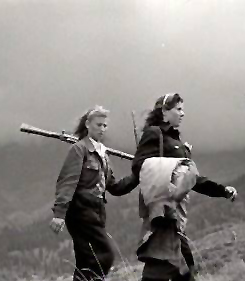The (Warrior) Women Men Don’t See
“A nation is not conquered until the hearts of its women are on the ground. Then it is finished, no matter how brave its warriors or how strong their weapons.” – Cheyenne saying
 When asked who the Greek god of war was, most people will answer “Ares” but that’s incorrect. The Hellenes had two gods of war and made a distinction between what type of conflict each oversaw. For wars of conquest in which armies invaded someone else’s home territory, the deity in charge was indeed Ares. For wars of defense, the presiding presence was Athena (as always in those palimpsest myths, the rule’s not absolute: in the Iliad, Athena’s intense liking of Odysseus overrode her formal duties).
When asked who the Greek god of war was, most people will answer “Ares” but that’s incorrect. The Hellenes had two gods of war and made a distinction between what type of conflict each oversaw. For wars of conquest in which armies invaded someone else’s home territory, the deity in charge was indeed Ares. For wars of defense, the presiding presence was Athena (as always in those palimpsest myths, the rule’s not absolute: in the Iliad, Athena’s intense liking of Odysseus overrode her formal duties).
This is directly relevant to the endless natterings in SFF about whether it’s problematic to prominently feature women warriors, especially in the self-labeled “realistic” grittygrotty mode encouraged by the success of George Martin’s Songs of Ice and Fire. One standard defense to this question is to quote names of warrior queens (Boudicca of the Iceni, the Truong sisters, Lakshmi Bai, Laskarina Bouboulina, Nzinga Mbandi, Jeanne d’ Arc), mention women who fought disguised as men and women warrior groups across eras. Frankly, the issue is irrelevant to whether women warriors existed in history and should also be irrelevant to a genre that freely postulates magic and mythical beasts.
What’s relevant is the fundamental truth that underlies the Athena/Ares split: women have fought in equal numbers to men in the defense of home territory. That’s why resistance movements always have a healthy percentage of women all the way up the ranks, including executive officers. In fact, if someone looks at the names I listed in the previous paragraph their uniting attribute is that they were all home defenders.
Many attempt to argue that the term “warrior” implies special training, implements, ethos, etc. However, Toussaint l’ Ouverture is universally deemed a warrior regardless of his relevant formal credentials. The definition of warrior includes one non-negotiable item: bravery in fighting. Women can be summarily dismissed from this equation only if one limits the definition of “warrior” to an elite caste whose entire vocation and raison d’ être is war. But most women – and, incidentally, most men – who fought in resistance movements or defensive wars against invaders and occupiers were not professionals. They were teachers, doctors, craftspeople, factory workers, farmers. Those who were still standing when the fight ended went back to their real occupations with scars and stories handed down the years.
 People who become warriors because they must usually lack the aura of the strutters arraigned in the finery of moran and samurai, Jedi and Rohirrim. At the same time, neither do they present society with the intransingent problems of reintegration, polarization, power differentials. And societies that are not fatally fixated on machismo recognize such bravery. In my own culture, the last stand of Dhéspo is as celebrated as that of Leonídhas. The term of my tongue for someone truly brave, pallikári, is neuter and used for everyone whose behavior fits the definition.
People who become warriors because they must usually lack the aura of the strutters arraigned in the finery of moran and samurai, Jedi and Rohirrim. At the same time, neither do they present society with the intransingent problems of reintegration, polarization, power differentials. And societies that are not fatally fixated on machismo recognize such bravery. In my own culture, the last stand of Dhéspo is as celebrated as that of Leonídhas. The term of my tongue for someone truly brave, pallikári, is neuter and used for everyone whose behavior fits the definition.
Both my parents were such fighters. It’s well past time for SFF to absorb the fact that bravery is a universal not particularly high in the Maslow scale nor confined to a chosen few.
Related articles:
Is It Something in the Water? Or: Me Tarzan, You Ape
Ain’t Evolvin’: The Cookie Cutter Self-Discovery Quest
Caesars and Caesar Salads
So, Where Are the Outstanding Women in X?
We Must Love One Another or Die: A Critique of Star Wars
Images: Adártisses (women guerillas) in WWII Hellás. Top, Cretan grandmother and granddaughter; bottom, Mountain Fighters, from the Rizospástis archive.


I just came back from Lemnos, where on the northern port of Kotsinas is a massive statue of the local heroine Maroula, sword in hand! 🙂
I have a hard time wrapping my mind around why some guys seem so threatened by the thought of fighting women that they end up denying even their historical existence. I don’t think it’s macho culture per se to begin with, because that normally ‘elevates’ women warriors and celebrates them along with women rulers. It looks more like a particular flavour of machismo, probably topped with entitlement, in which masculinity is overly fragile.
I agree — we’re dealing with very deep insecurity.
And sometimes the number of warrior women gets underestimated:
http://onlinelibrary.wiley.com/doi/10.1111/j.1468-0254.2011.00323.x/abstract
It certainly does (measuring pelvic angles has done much to correct that) — but the kernel remains that “warrior” and “professional warrior” get routinely conflated in SFF. Part of a larger pathology.
But most women – and, incidentally, most men – who fought in resistance movements or defensive wars against invaders and occupiers were not professionals.
Definitely was true in East Timor. In East Timor, women played a big role in the resistance–it’s come up in every book I’ve read, and I’ve seen photos.
If you look at photo archives of any resistance movement, regardless of culture, the significant presence of women is unmistakable.
People who become warriors because they must usually lack the aura of the strutters arraigned in the finery of moran and samurai, Jedi and Rohirrim. At the same time, neither do they present society with the intransingent problems of reintegration, polarization, power differentials.
An element I’ve seen omitted in SFF, among others – one that strikes as just as telling as the persistent questioning of whether it would be problematic to depict fighting women in the foreground.
There have been a couple of SFF anthologies that focused on the issue of returning fighters, but they were mediocre-to-poor. It’s part of the heroic individual trope that still largely rules the genre.
Hands down and without a shadow of a doubt, women are by far the strongest of individuals. Men may have a stomach for shit, gore, blood and piss, but, A mother’s vigilance over her children in the darkest hours of the night running on fumes… Enough said.
Angel, my dear, how lovely to hear from you after all this time! And of course I agree with you. *Smile*
Beloved Captain, I`ve missed you too. Working in the hospital enlightened me with regards to the true strength and valor of women. I do apologize for the profanity, Alas, We are sailors.